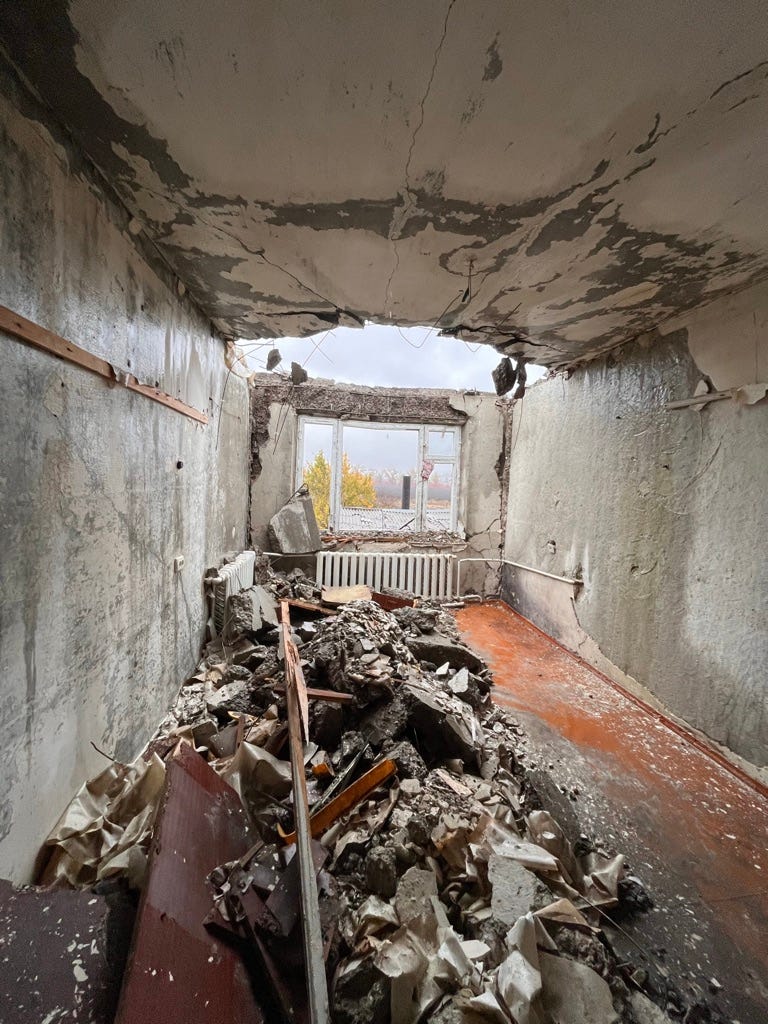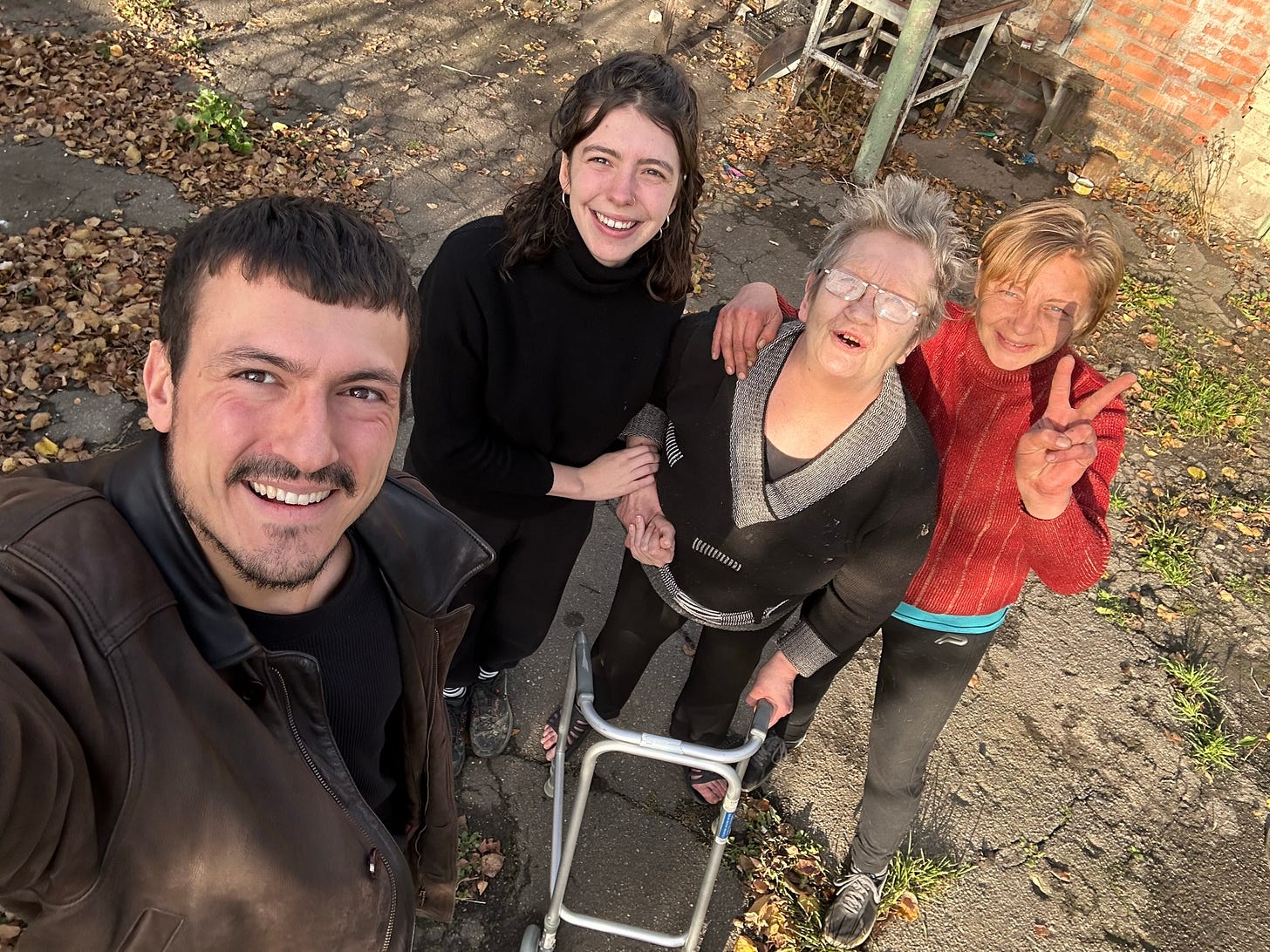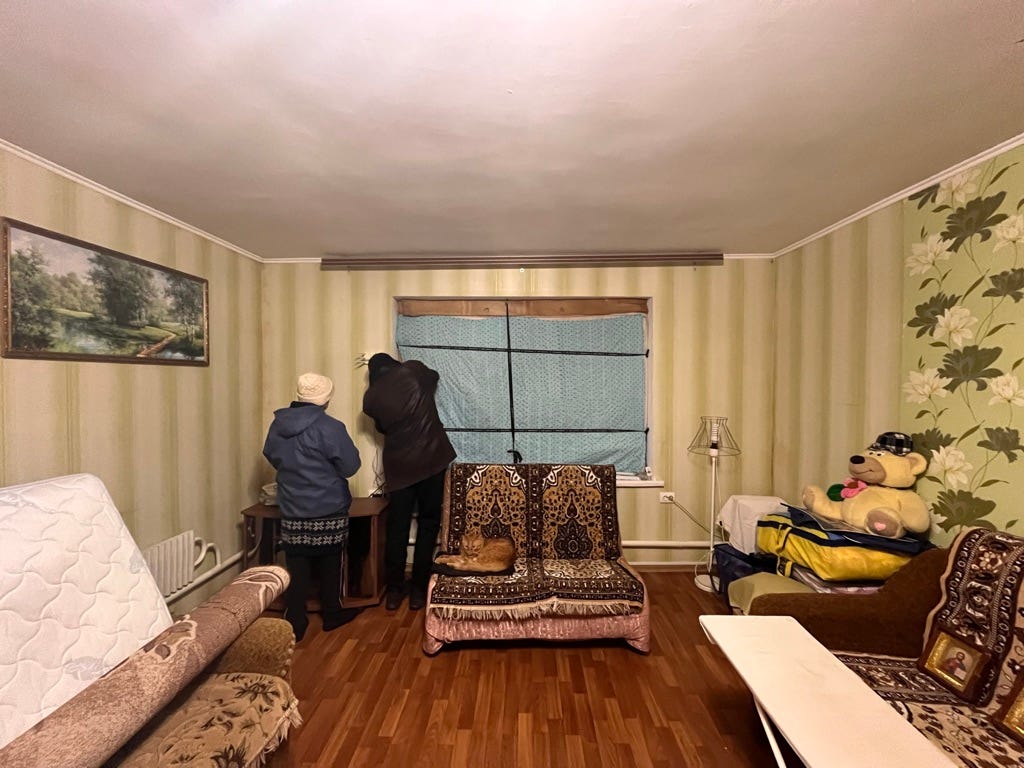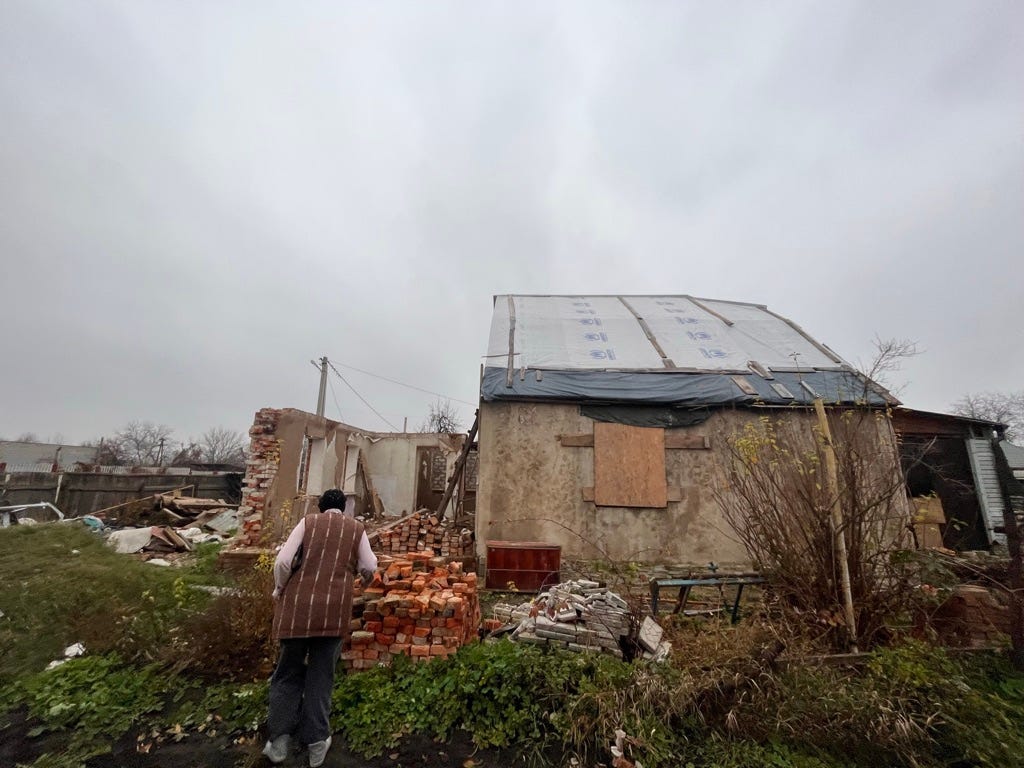KHARPP repairs
an update and an introduction
Over the past month, KHARPP has been active on both sides of the Polish-Ukrainian border as usual, but this report focuses on our work in Ukraine. In mid-October, we finally visited Druzhkivka, the city in Donbas where we have been sending aid packages, in order to see for ourselves where all our boxes had been going. We met up with a church there who have also been providing aid for both their hometown and the surrounding villages, many of which were, until recently, under occupation. We were really honoured that Alina and Sergei, two members of the church, agreed to take us with them on their aid delivery round to some of the de-occupied villages around Lyman. We had brought with us two thousand pounds’ worth of food, medicine, and hygiene products from Dnipro, the nearest major functioning city.
The destruction that we saw in these villages was beyond imaginable. Entire communities have been wiped out, and their homes levelled to the ground. Those who remained behind and lived through the occupation told us horrific stories of kidnappings, torture, and death. Generally elderly or disabled, many of these people have spent months living in basements. One group of women we met still lived in the damp cellar of their two-storey apartment building, sleeping on bails of hay, after a missile destroyed their homes. Living without electricity, water, or heat, the bleakness of their existence is beyond imaginable. We offered to help with evacuation, but they refused. One woman called Valentina told us that this was where she and her husband had moved in 2014, after conflict had broken out in their home city, Donetsk. Standing in her flooded apartment, which they had renovated just months before the Russians arrived, she told us that under no circumstances would she leave her home again. Her husband was now buried in this village, and she would not leave him. Another elderly woman in a different village greeted us from the front garden of her cottage where she stood next to a wooden cross. She had buried her husband herself after his heart gave out due to shelling over the summer.
Our final stop of the day ended up being at a tenth birthday party for a little boy called Dima. The only child left in his village, he is unable to even attend school online, as there is neither electricity nor phone signal in his village. His best friends are his three cats, his dog, and the Ukrainian soldiers who moved in down the road after the village was liberated a month ago.
Most of these villages are not places where aid organisations tend to go; they are off the main highways and difficult to find if you don’t know what you are looking for. The roads are still strewn with burnt-out tanks, and there are checkpoints at almost every turn. Makeshift pontoon crossings have replaced the destroyed bridges across the region’s rivers, making these areas inaccessible to larger cargo vehicles. Whilst the people we met there were appreciative of the food, medicines, and hygiene products we were bringing them, more than that they wanted the company.
From there, we travelled on to Kharkiv, where we met with Anna, a maths teacher who had contacted us for home repairs. Living in a small town north of the city with her husband and their son, a rocket had landed in the street immediately outside their house in March. The force of the blast had blown their front door off, destroyed their windows, and shattered the walls of their outdoor toilet. With the harsh eastern-European winter approaching, they were worried about being entirely exposed to the elements. We agreed to help. New windows and a new front door have been ordered, and are due to arrive and be installed next week. We will then work with them to rebuild the walls around the toilet. Anna continues to teach online, when she has access to phone signal or the internet, which is currently intermittent. She is concerned for the winter, however, because last month she did not receive her salary, and she is currently the only earner in the family. Her husband is unemployed as a result of the war. Even prior to the invasion they were poor, the three of them living in a house measuring just thirty six square metres – roughly the size of two parking spaces. They could not afford to pay for repairs themselves, and up until this point they’d blocked up their windows with sandbags, and around the toilet they’d hung thin plastic sheets. This was how they were planning to live through the winter before they reached out to us.
Since then we have had requests from a number of other families in the region for repairs to roofs, windows, and doors. Most of these are people in villages which were either occupied, or existed on or near to the frontline for the six months or so from the start of the war until the liberation of the Kharkiv region in September. The scale of the damage varies from village to village, but in some of them, almost every house has either been destroyed or heavily damaged. These are now ‘ghost villages’, with very people few left living in them, and in some cases they are completely deserted. Driving through them is an eerie and deeply depressing experience. In those villages where only a handful of people have remained, they have usually done so because they have nowhere else to go — a reminder that the choice of whether to stay or leave to seek refuge in Europe is a privilege not afforded to all.
In one village north of Kharkiv we met Lyuba, a woman in her eighties. Her garden was hit by shelling in August, blowing out her windows and damaging a large amount of her roof. When we came to her house, her neighbours were helping her to cover the windows and the holes in the roof with plastic sheets – but in an area with no gas, electricity, or phone signal, she will struggle to survive the winter with her house in its present condition. She currently lives alone because her only son was arrested by the Russians during the occupation and is now trapped in Belgorod, unable to get back home. The few remaining men in the village chop firewood for her. Later that day we dropped by the window firm in the nearby town and ordered new windows for Lyuba. They will arrive in two weeks. We are working on a solution for Lyuba’s roof as well, so that she will at least be able to keep her house warm and dry throughout the colder months ahead. The snow and frost would almost certainly cause permanent damage to the structure of her house and its interior if allowed in, thus becoming a more costly renovation job in the future, which the old lady would never be able to afford. It is therefore essential to act now, before it’s too late.
Right now, this feels to us like the most important work we can be doing – winters in Kharkiv and eastern Ukraine are brutal, with temperatures settling below zero from December to February. Without protection from the cold, people will struggle to stay in their homes over the coming months, and will further risk their lives in doing so, especially if Russia continues to attack energy infrastructure. This could in turn lead to a new wave of refugees into Europe, where resources are already stretched very thin and there will be little capacity for them. Windows cost around £150-200 each, doors are £300-400, whilst roofing is on average £1000 per house. This isn’t a case of totally rebuilding someone’s home. We are focusing our efforts exclusively on emergency home repairs, enabling people who have stayed in their homes to live through the colder months and to survive into spring. Each house is costing us £500-2000, and we are trying get as many as possible done over the next few weeks, before it becomes too cold to do external work. We have named this new phase of our project ‘KHARPP repairs’, and in support of this we are launching a renewed winter donation drive, to enable us to finance this work for as long as the weather here allows (approx. 3-4 more weeks). Your generosity in supporting us has been extraordinary thus far, and we are forever grateful for that. However, if you are able to make another donation now, it could make a huge difference to someone’s life for the months ahead as we try to help people prepare for what will be the hardest winter in Ukraine in living memory.
Ways to donate:
Preferred:
Bank transfer:
Lloyds Bank
KHARPP LTD
SORT CODE: 30-91-92
ACCOUNT NUMBER: 78039660
IBAN: GB80LOYD30919278039660
BIC: LOYDGB21075
Other ways:
What was once Valentina’s kitchen in the village of Drobysheve, Donetsk Oblast.
Where she now sleeps in the cellar underneath the building.
Alex at Dima’s birthday party in the village of Yampil, Donetsk Oblast.
With granny Larissa outside her home in the village of Bezruki, Kharkiv Oblast. When we met her she was barely walking with two Soviet-era wooden crutches after a stroke had impaired her mobility. We returned the next day with a proper metal walking frame for her.
A destroyed house in the village of Slatine, Kharkiv Oblast. We are helping the residents repair the outhouse – which was not flattened – so that they have somewhere to live this winter.
Measuring for replacement glass for a blown-out window covered by a mattress in Derhachi, north of Kharkiv.
A direct hit on this house in Kharkiv Oblast destroyed half of it and left the other half without windows or a roof.
A woman stands outside her home in Slatine, Kharkiv Oblast. It was badly damaged by shrapnel and shock waves from a blast a few metres from the house. On her makeshift fence (the old one was destroyed) she has written ‘PEOPLE’.












With KHARPP REPAIRS You are doing extraordinary inspirational work ;improving shattered lives through your investment of time , materials and above all on the ground action . Onwards with KHARPP
Thank you, Ada, for this very troubling and moving account of conditions in the places you visited - and thank you and your team of volunteers for your steadfast determination to support your fellow human beings in their hour of need. Thinking of you - and hoping you'll have the strength to carry on the good work in spite of the obstacles and hardships.